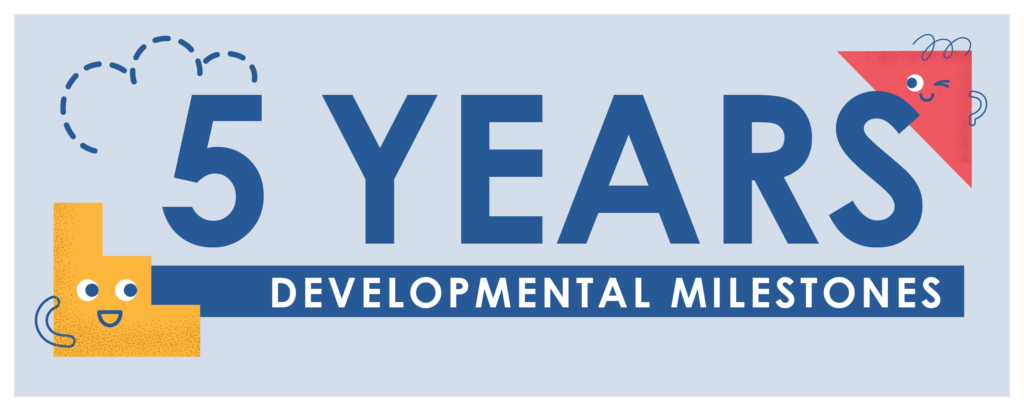
The way your child learns, plays, and acts shows you important steps in development. All children grow and develop at their own rate. However, most follow a predictable skill path along the way. These skill paths are called developmental milestones; skills that most children can perform by a certain age. Refer to the checklist below to determine what milestones your child has completed by five years of age.
By five years most children:
Fine Motor (skills that require balance and movement of small muscle groups)
_ Have a hand preference (righty or lefty).
_ Grasp a pencil like an adult.
_ Cut and paste simple shapes.
_ Color within the lines.
Cognitive (memory, problem solving, thinking, and overall play)
_ Count 10 or more objects.
_ Can print some letters and numbers.
_ Know about things used everyday like money or food.
_ Draw a person with at least six body parts.
_ Confuse fantasy and reality at times.
_ Understand and name opposites.
Communication
_ Tell stories using sentences.
_ Speak very clearly.
_ Use future tenses “Mommy will be here after work.”
_ Say full name and address.
Social-Emotional
_ Want to please friends.
_ Want to be like their friends.
_ Follow and understand rules, right and wrong.
_ Show more independence (stays by a friend’s
house).
Gross Motor
_ Hop, maybe skip.
_ Run like an adult.
_ Jump rope.
_ Walk on a balance beam.
Self-Care
_ Use the bathroom completely independently.
_ Dress and undress independently.
_ Use all utensils to feed themselves.
Talk to your doctor or contact an early intervention program in your community if you notice any of the following signs of a possible developmental delay in your child of five years of age:
_ Unusually withdrawn and not active.
_ Shows extreme behaviors (sad, shy, angry, fearful or aggressive).
_ Doesn’t respond to people.
_ Can’t focus on one activity for more than five minutes.
_ Can’t tell the difference between real and make believe.
_ Doesn’t talk about daily experiences.
_ Doesn’t speak clearly or use correct grammar.
_ Doesn’t play or interact with other children.
_ Can’t perform self-help skills such as dressing and toileting independently.
_ Loss of skills.
ASQ. Ages and Stages Questionnaires, Third Edition (ASQ – 3)
CDD. Centers for Disease Control <www.cdc.gov>
D’Eugenio, Diane and Rogers, Sally J. Early Intervention Developmental Profile (EIDP). 1981. University of Michigan.


Leave a Reply